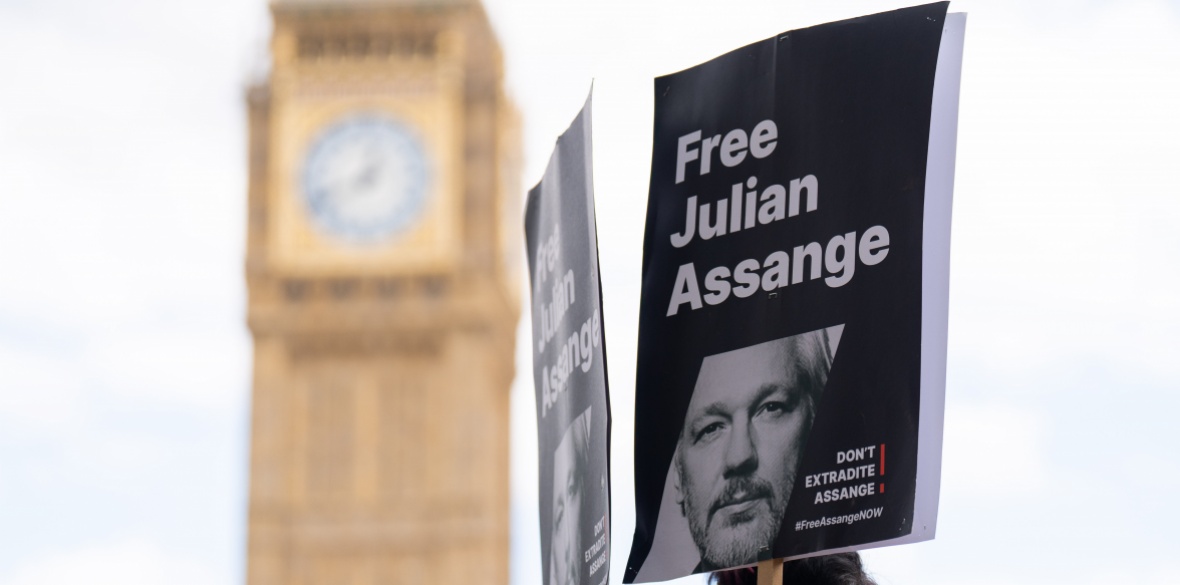This is the last article you can read this month
You can read more article this month
You can read more articles this month
Sorry your limit is up for this month
Reset on:
Please help support the Morning Star by subscribing here
WHEN Julian Assange enters the dock at the Royal Courts of Justice at the end of this month he will have completed nearly five years in HMP Belmarsh. How much longer he will be a British prisoner will be for the court to decide. It is perfectly possible that within days, he will be on his way to Washington.
This, potentially final, stage of his legal campaign to resist extradition comes exactly four years after it began — in Woolwich Crown Court, within the Belmarsh campus.
One member of his legal team told me that the chances of a favourable outcome at this stage are slight. “We are not pleased about the judges who will hear our case, and although our arguments are very strong, they have already been rejected once,” they said.
To the casual observer, Assange’s legal journey appears Byzantine. At the original extradition hearing, the Australian’s legal team made several arguments for rejecting the application, including the following.
The British/US extradition treaty rules out extradition for political crimes; a fair trial is not possible for numerous reasons not least spying on Assange’s meetings with his lawyers; prosecution would violate Assange’s right to free speech; and, custodial conditions in the US would have a catastrophic, clinically predictable, affect on Assange’s health.
Judge Baraitser, who heard the original case, rejected all those arguments, save the possibility that extradition would be “oppressive” in respect of Assange’s health.
Her finding came after several gruelling days in court when Assange’s medical issues were presented in forensic, if harrowing detail. He has attempted suicide on several occasions in the past, a long period of effective solitary confinement during his first year in Belmarsh significantly damaged his health, and solitary confinement of some kind would be a near certainty if he enters the US penal system.
Alas, the hopes unleashed by Baraitser’s humanity were short-lived. The US appealed her judgement, largely on a contentious procedural point, and untested assurances about likely penal conditions. Her ruling was overturned.
The two-day hearing at the end of February will consider two appeals. The first is against Baraitser’s dismissal of all the other arguments against extradition. The second is against the decision by then-home secretary Priti Patel to issue an order for Assange’s extradition as soon as the legal process is exhausted.
Overturning the minister’s decision seems unlikely. Assange’s legal team believes that new evidence in respect of the other arguments is compelling, but accepts that they face an uphill struggle.
Were this application for an appeal to succeed, then the case would be heard in full later in the year.
If all of those arguments are rejected, then the final legal hope of resisting extradition lies with the European Court of Human Rights (ECHR). Assange’s case has already been lodged with the Strasbourg judges.
However, it is at the discretion of that court to hear cases, based on whether the legal authorities consider the contested points of law sufficient to merit their attention. To put Assange’s case in context, last year there were 63 applications to the ECHR for “interim measures,” of the kind Assange would need. Only one was accepted.
Diplomatic developments on the other side of the world might ultimately have a greater impact on Assange’s prospects of freedom, however. The election of a Labour government in Australia, under the premiership of Anthony Albanese, added a significant new voice to the coalition calling for Assange’s release.
Responding to this, last August, the US ambassador to Australia Caroline Kennedy told the Sydney Morning Herald that she thought a plea deal could be open for Assange. Such an arrangement would probably involve Assange pleading guilty to a lesser charge for which the period of imprisonment would be no greater than the time he has already spent in prison.
This could have significant advantages for Assange — not least because it would allow him to travel the world without constantly fearing a fresh US initiative to affect his detention and extradition.
His legal team remain cagey about why this process has stalled for the past six months, but it is understood that negotiations are ongoing.
Whether such a deal will satisfy free-speech campaigners remains to be seen. For them, the importance of the case remains the use of the Espionage Act to prosecute a publisher. If an Australian, living in Europe, can be pursued by the US for encouraging a source to share evidence of criminality, then investigative journalists the world over are at risk.
No doubt when Assange does step into the dock, there will a a noisy demonstration outside the Royal Courts. It is a credit to many of those demonstrators that they have stuck with the cause for over a decade. Indeed, the emblematic revelation at the heart of this case is the “collateral murder” video.
Filmed from a US army helicopter flying over Baghdad, it dates back to 2007 and records unarmed civilians mown down with a heavy machine gun. Twelve lost their lives, in what many consider to have been a war crime.
Since the early days, when a handful of followers protested on Assange’s behalf, the campaign has steadily drawn a broader constituency. It now includes organised labour around the world, the newspapers that once denounced Assange and even right-wing commentators such as Peter Oborne and Andrew Neil.
As the Wikileaks founder takes his seat and the proceedings begin, it is impossible to know whether any of their arguments will have persuaded the judges. Assange will hope that at least one is sufficient to bring his ordeal to an end.
Tim Dawson is the deputy general secretary of the International Federation of Journalists — www.ifj.org.












